Don't wanna be here? Send us removal request.
Text
Tel Aviv Vacation
With a ten-day period between leases, jobs we can do from anywhere, and family visiting, we decided to make the most of our homelessness and take a vacation!
We stayed in the crunchy neighborhood of Florentine for the first three nights, in a perfect airbnb. We had oatmeal in the airbnb, spent mornings at the beach near Jaffa, had a relaxing lunch in the airbnb, and went out for delicious meals in Florentine (Cafe Casbah, Mezcal, and Zaci were all on the same delicious block).

Florentine was a perfect location for us: delicious food, fun street art and galleries, and a low-key and local atmosphere.

We loved the proximity to Jaffa and the beach, and even went on a morning stroll to the Jaffa Flea Market for some windowless shopping.

We headed up to North Tel Aviv/Herzliya for the next six nights of our vacation. Kenny’s sister, Kari, and her husband, Eric, and their son, Finn, were visiting from Denver!
During the first few days, our airbnb was half-hour walk along the beach to where our family was staying. It was a lovely, yet very warm, morning walk!

We had a very lovely and slow-paced visit with family. We would meet up around lunch time at the pool at the hotel and have a nice swim. Then, we would play a rousing game (or two or three) of Oh Hell, a family favorite trick-taking card game. We would have a snack and then head down to yet another beautiful beach. After the beach (swimming, sandcastles, paddle ball), we would shower and have dinner.

In the middle of our visit with family, we spent a day in Jerusalem. We had lunch in the market and visited old city, specifically the Western Wall and the Church of the Holy Sepulchre. I love the market!

I am so grateful for our family coming to visit. It was so refreshing to spend time with people we know and love!

We’re all settled into our new apartment now, with its wonderful views, returning to our routine and preparing for whatever adventure comes next!
4 notes
·
View notes
Text
Cave of Elijah and Bat Galim Beach
On a recent Sunday, we braved the Israeli summer heat and direct sunshine for a little adventure. Our plan was to visit the Cave of Elijah, walk along Bat Galim Beach, have lunch at Eataliano, ride the cable car up the mountain, and visit the Stella Maris Monastery.
The Cave of Elijah is a grotto where the prophet Elijah took shelter during a journey in the wilderness. In the Book of Kings, Elijah has been traveling for 40 days and 40 nights, when he takes shelter in a cave for the night. Upon awakening he is talked to by the Lord. There is a Cave of Elijah on Mount Carmel, about 40 m above sea level, that has been venerated for centuries by Jews, Christians, and muslims.
Another cave associated with Elijah is located nearby, under the altar of the main church of the Stella Maris Monastery. Built in 1836, the monastery houses the Carmelite Order, which was established in the late 12th century when Crusader-era pilgrims, inspired by the prophet Elijah, opted for a hermetic life on the slopes of Mount Carmel.
We rode a bus from our apartment about two-thirds of the way up Mount Carmel to sea level and then walked the quarter mile to the first Cave of Elijah. I had already visited with my brother and sister-in-law on my birthday, and was also wearing shorts, so I opted to make furry friends outside while Kenny went inside to see the cave. Kenny was also wearing shorts and was allowed to enter, as long as he covered his head.

We walked to the beach and enjoyed watching the windsurfers, and beach goers. It was a beautiful day and Bat Galim beach was jellyfish free (which is rare in Israel this time of year).
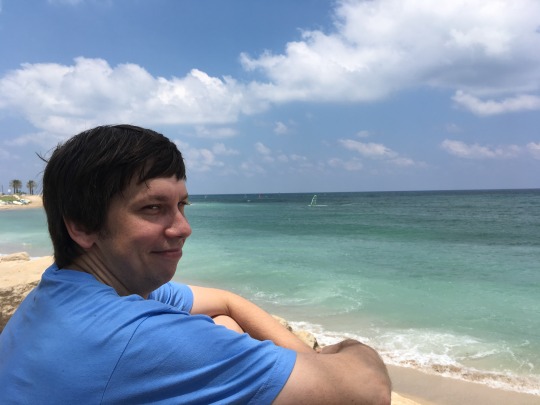
We enjoyed a delicious lunch at Eataliano, which might have the best view in Haifa. It is situated on the second story just a hundred yards or so off the beach, and there are many tables with a beautiful view of the water. Since we were there for lunch, we snagged one of those beautiful tables, without a reservation.

I had the sweet potato ravioli and Kenny got a pepperoni pizza. Both were delicious! But I think Rafaello is still my favorite Italian-esque restaurant in Haifa.
After a slow lunch (with espresso afterwards to perk us back up), we rode the cable car to the top of the hill, with the intention of going to the Stella Maris Monastery. Unfortunately, it was closed between the hours of noon and 3PM. Rather than wait for a few hours, we decided to come back another time. We made our way to the bus stop for the ride home.
4 notes
·
View notes
Text
Little Differences between Everyday Life in the US and in Israel
After a few months in Israel, I created a Google Sheet, which I titled “Differences Israel/USA,” where I would jot little differences down when I noticed them. I now have a bonafide list of amusing differences to share.
Car Locks - In the USA, you lock your car. In Israel, you lock your car and most people also have a second lock for their steering wheel (that has a numeral code that you enter each time you want to start the car).
Strollers - Babies in the US, generally sit up in their strollers, after about six months. It must be a faux pas to have an upright baby in Israel, because almost all babies lay flat in strollers here.
Bathroom Light Switches - In the USA, bathroom light switches are on the inside of bathrooms. In Israel, bathroom light switches are outside bathrooms, most of the time. I asked one of my colleagues about this, and she said it was due to some concern about electricity and water. I find this amusing, because there are often exposed wires in bathrooms (and our bathroom has a heater - a welcome addition to the lack of central heat - with open coils).
Gender & Bathrooms - Gender and bathrooms combine to create an explosive political issue in the USA, but in Israel, most bathrooms are co-ed or genderless. Many restaurants have two or three small, genderless toilets behind closed doors, and a shared sink area.
Cost of Cell Phone Plans - In the US, Kenny paid $50 a month for his bring-your-own phone cell phone plan. I was still on my parents plan (thanks, Mama and Papa). In Israel, we pay $15 dollars a month for both of our plans. That includes enough data and some international minutes!
Penny Pinching - When your food costs $5.52 in the US, you better have those two pennies. In Israel: "Ehh, you don't have that last 6 shekels - no big deal!" When paying in cash at small businesses (like falafel stands), don't be surprised if the last little bit of your bill is waved off.
Negotiating - In the US, even at markets, prices are set and price tags are present. In Israel, when you go to markets (or even when you are working to decide on rent with your landlord), you are expected to haggle. Most items do not have price tags - their prices are almost entirely subjective and sometimes tourists are given higher prices than locals.
Bagging Groceries - At most grocery stores in the US (except Aldi), someone is there to bag your groceries. And in most places, plastic bags are free (I’ve only paid for a plastic bag in the US once and that was in DC). Even small-town grocers have high schoolers to bag your groceries (Kenny was once a bag boy). In Israel, you are expected to bag your own groceries, and the plastic bags are not free. What surprises me, in our middle-class neighborhood, is that most people pay for the bags, rather than bring their own reusable bags! How wasteful (squared)!
Hot Water - In the US, most homes and apartments have electric or gas hot water heaters. In Israel, most homes and apartments have solar water heaters AND an electric water heater for the winter. The water in the summer is incredibly hot, but it gradually cools down as the winter rains arrive.
Cleaning the Floor - Maybe I have just missed something here? When you clean the floor in the US, you generally use a mop and bucket or a swiffer. Here, there are just these oversized squeegees and rags. It is a skill that I have not honed, which is why our tile floors are less than sparkling. I am happy to acquire this skill, if anyone is willing to share their knowledge.
College-Aged Adults - In the US, college-aged people carry their smartphone, wallet, and car keys. In Israel, they carry their smartphone, wallet, automatic rifle, and bus/train pass. Conscription exists in Israel for all non-Arab citizens. The normal length of compulsory service is currently two years and eight months for men (with some roles requiring an additional four months of service), and two years for women. It’s hard to get used to seeing pimple-faced 18 year olds, dressed in street clothes, carrying automatic weapons.
Lines - Lines in the US mean “wait your turn,” and most are respected. In Israel, they are merely suggestions. Kenny and I have witnessed a vicious screaming match over who was first at the grocery deli counter (we didn’t weigh in), and I have often had to muscle in front of someone who was trying to jump the line at the checkout counter. I have heard this is the case in many places around the world. In my opinion, it is the worst while waiting in line to check into flights at the airport (especially for those dreadful 5AM flights to the US out of Tel Aviv). The problem has been mediated at the Post Office, Pharmacy, and Health Clinic by machines that have you take a number and wait until your number is called.
Bag Check / Security - In the US, you sometimes have to show the contents of your bag when you are exiting a store, to ensure that you did not steal something. In Israel, you have to show the contents of your bag when entering most larger stores, malls, or large buildings. At our local grocery, the security staff no longer checks my bag (they recognize me), but they often ask Kenny (in Hebrew) if he is carrying a weapon.
Traffic Lights - I love Israeli traffic lights! They have an “on your mark, get set, go” feature! When the red light is changing to green, the red starts to blink, and then turns to yellow, and then green. The same is true in reverse. People are less likely to get caught on their phones or buzz through a yellow light.
Illegal Parking - In the US, if you park illegally, you will be towed. Promptly! In our neighborhood, so many Israelis ignore the traffic rules that it is simply not possible to tow all the illegally parked cars away. It doesn't help that there are never enough parking places; cars are often parked on sidewalks.
Rules in General - Much like lines, in the US, rules are respected and generally followed. In Israel, rules are considered suggestions. The one who gets ahead in Israeli society knows how to bend the rules to fit his own goals.
Car Seats - In the US, it is not legal to have child car seats in the front seat. Here, in Israel, there are countless infant seats in the front seat of cars. HOW IS THIS SAFE?
Water Glasses - When you go to a restaurant in the United States and order a glass of water, you will receive a healthy helping of ice cold H20. In Israel, you will receive a sad, room temperature shot glass of water. I am a very thirsty person, drinking on average 120 ounces of water a day. And... I just miss ice (especially in the heat of Israeli summer). I would like a big girl glass, please, with so much ice that it is sweating.
Food - Food is just of such a higher quality here. All grocery stores are also mini-bakeries, with absolutely amazing fresh bread and pastries. In the US, when Kenny and I would go out to eat, he would usually have his pick of the menu, while there would be two or three vegetarian options for me. Here, it is the exact opposite! And SALADS here are respected and honored, given the proper place they deserve as real (and not diet food).
Does anybody have anything else that I should add to my list?
4 notes
·
View notes
Text
A Visit to the Midwest
Kenny and I made a quick trip to the midwest in June. It made the month of June fly by! We visited with my parents in Omaha for the first weekend, spent the week with his parents at their farmhouse, and traveled back to Omaha with his parents to celebrate Father’s Day and Kenny’s dad’s birthday with the entire nuclear family. We did much more than that of course, including a family BBQ in southern Minnesota and many walks around the farm and Omaha.

Once we returned to Israel, we were thrown right back into our life here: Kenny is a few days away from turning his book manuscript to the publisher and a handful of days away from intensive Hebrew courses, I have returned to my three contract jobs and trying to keep our one relatively-sick cat alive until our lease ends on July 31.
Both of us really struggled with jet-lag and insomnia on this return trip. We would go to sleep just fine, and then, around midnight, wake up and struggle to fall asleep for hours. It lead to a really long week, and a slow return to normal, despite our workload.
0 notes
Text
Petra and Wadi Rum
When Jesse and Katie were visiting back in March, Kenny and I had the opportunity to join them on a trip to Jordan, to go to Petra and Wadi Rum. We jumped at the chance, and they were nice enough to schedule the trip around Kenny’s Hebrew class.
We traveled to Aqaba separately, Jesse and Katie arriving as a part of a tour from Tel Aviv and Kenny and I arriving by convoluted (yet efficient) public transportation. Our first destination: Petra! The drive from Aqaba took about two hours, but was full of magnificent desert landscape. We stopped to snap photographs from an overlook.

Petra itself was incredibly magical. Having visited Rome only a few weeks before, Kenny and I had not been expected to be visiting another large ancient city, but that is exactly what Petra was (at its peak, the population is thought to have been around 20,000), and is! I think that we walked about ten miles, stopping to explore many ruins and wonders.

We had wonderful weather and got to meet lots of cats, donkeys, camels, goats, and puppies. I was happily surprised that so much history could also be surrounded by so many animals. Our experience in Petra was full of many of my favorite things: natural wonder, history, human intrigue, fluffy domesticated animals, lots of walking, and Kenny, Jesse, and Katie!

We stayed a night near Petra, at this really amazing resort that was designed to look like an old village. We were all exhausted, so we didn’t enjoy the amenities, but we did enjoy the buffet dinner and breakfast.
Our next stop was Wadi Rum, which is a desert wilderness. It is full of dramatic sandstone mountains, natural arches, and prehistoric inscriptions and carvings. Both Petra and Wadi Rum were along the silk road, the ancient trading route that connected East and West.
There were also camels - and we rode them! Kenny’s was named Obama. There were lots of jokes made at his expense.


We had a jeep tour around Wadi Rum, stopping at a variety of spots along the way, including to have lunch made over a fire. We stayed in a beautiful hotel, in a luxurious yurt. We got there early for dinner, so Kenny and I were able to introduce Jesse and Katie to some card games.

The next day we started the long journey back. We traveled from Wadi Rum to the Eilat bus station together. Jesse, Katie, and I then traveled to Jerusalem, while Kenny returned to Haifa.
It was a beautiful, fun trip, and I am so grateful that Jesse and Katie welcomed us on their travels!
0 notes
Text
The Best Birthday an Expat Could Ask For
My birthday this year was the most memorable one yet: 29 is surely off to a great start!
Earlier in the week, I had opened a special gift from my parents: an Atlanta United t-shirt! It was fun to get a package from the other side of the world.
My day started with a special breakfast. When we were kids, my mom let us get a sweet cereal on a birthday. I have fond memories of cinnamon toast crunch and rice crispy treats cereal on my or my siblings birthdays - a special way to celebrate the day on a busy weekday morning! I didn’t go all in and get sweet, processed carbs; instead I picked out a coconut granola that I had been eying, and enjoyed a scoop of the sweet, crunchy deliciousness on my usual morning oatmeal. Delicious!
Kenny headed to class and I squeezed in some work from home. I had to hurry to get my hours in because I had special visitors who were making their way to town: my brother and his wife! They are great travelers and were sweet enough to come all the way from Austin to visit us in Israel! AND it worked out that they were going to be around on my birthday!!

We met at the Louis Promenade for the Bahá'í Gardens tour. We were all early, so we had a little bit of time to catch up before the tour started. I had already been on the tour once before, but enjoyed absorbing the sights and learning more about the Bahá'í religion.
After the tour, we headed to Beit Hagefen Arab-Jewish Cultural Center, a multi-cultural organisation that aims to bring together Arabs and Jews and promote coexistence and tolerance. They had a fascinating little gallery that we all enjoyed. Of course, as a museum professional, I only took a picture of my favorite label...

We walked through the market to grab some lunch at Falafel Ha'zkenim, one of the two best rated falafel shops in Haifa (that are ironically across a tiny street from one another). It might have been the company (the three of us silent while indulging) or the ladleful of tahini the put in at the top of the pita (imagine a soup in a bowl), but it will be hard to top that falafel experience!
The food will be the thing that I miss the most about Israel, whenever we leave.

With stomachs full of falafel and tahini, we walked to a part of Haifa that I had never been to before: Bat Galim.
Our first destination was the Cave of Elijah. We grabbed some coffee on the way and enjoyed walking along the Bat Galim beach before heading to the Cave of Elijah, which was quite a place. We had the option to hike up 45 flights of stairs to get to our next destination: the Stella Maris Carmelite Monastery.
We decided, instead of climbing up the stairs, to take the cable car! It was a fun ride, with beautiful views.

Built in 1836, the monastery houses the Carmelite Order, which was established in the late 12th century when Crusader-era pilgrims, inspired by the prophet Elijah, opted for a hermetic life on the slopes of Mount Carmel.
We ended our touristy day and took a cab further up Mount Carmel, to our apartment to catch up with Kenny and so that Jesse and Katie could meet the cats. They got the grand tour and we hung out for a little while. Kenny had a great suggestion of getting drinks at Camel Bar at the beach before dinner, and we did just that! We had the joy of watching the sun set over the water, while enjoying some delicious beverages.
I picked Raffaello for dinner. Kenny and I had previously had a delicious meal there once before, and I am so glad that we celebrate my birthday there with family! The food and ambiance were both impeccable (so much so that we plan on heading there to celebrate Kenny’s birthday in early April).
What a perfect birthday. It was so special to have Jesse and Katie in town to celebrate!
0 notes
Text
February
The shortest month came and went quite quickly here in Haifa. Now that we’re properly in March, we are looking forward to the end of the rainy season and the return to constant sunshine and warmth.

After returning from Rome, Kenny’s Hebrew classes started again. He is taking classes through the Ulpan at the University of Haifa.
In 1949, The Jewish Agency created the Ulpan, which is the model for all immigrant Hebrew-language courses in Israel. Most courses also provide instruction in the fundamentals of Israeli culture, history, and geography. The primary purpose of the ulpan is to help new citizens to integrate as quickly and as easily as possible into the social, cultural and economic life of their new country.
In addition to Kenny’s Hebrew class, we are also auditing a course, the Arab-Israeli Conflict, together. Taught by Kenny’s academic host, Zack Levey, the class meets every Tuesday afternoon for three hours. It is a masters level, international relations class. Kenny has taught the same class before, and is enjoying experiencing it in Israel. I am learning so much!
On a sunny Sunday in February, we took a trip to the beach, with a stop for falafel and shawarma. I appreciate the condiment bottle, full of tahini (yumm), and the small bowls to fill with whatever salads you want. I chose pickled cabbage and carrots, with spicy olives. Kenny didn’t want a side, so I ended up taking his empty bowl back up for pickled spicy peppers (they haven’t been pickled for more than a week - they still have the fresh spice and crunch of a fresh pepper). Those peppers + tahini + hot fried falafel just make for such a delicious combo!

The beach was beautiful, if not a little windy. There were quite a few people out for a Sunday (their Monday) afternoon. We grabbed some iced coffee from the bus station and enjoyed those while taking a stroll along the water. Only one person was swimming, most were enjoying the sunshine and the view of the water.

Kenny and I are both looking forward to our upcoming visitors: my brother, Jesse, and his wife, Katie! They are visiting Haifa on my birthday, and then we are going to head to Jordan as a group of four. Kenny will return to Haifa for class, but Jesse, Katie, and I will spend some additional time together in Jerusalem and the West Bank. I can’t wait to share my home with them, and to travel and learn together.
0 notes
Text
Rome
We just got back from a lovely trip to Rome, as a sort of late-honeymoon. In October, we decided to take advantage of all of the cheap Ryanair flights from Tel Aviv to Europe over the winter months, and Rome in February was the winner! Our flights were less than 300 euros combined. We stayed in a cozy airbnb, which was perfect for our needs and kept our travel and accommodations at less than $500.
Since this was our honeymoon, we decided to not worry about costs once we were there (we had set aside some wedding money for this purpose), but as the frugal people we are, we still managed to keep costs pretty low. Breakfast (a pastry and espresso) averaged around 10 euros and lunch and dinner between 20 and 30. We also had our fair share of additional espresso and (obviously) gelato. We paid for entrance to the Vatican Museums (16 euros each), to climb up all the stairs to the rotunda of St. Peter’s Basilica (8 euros each), and combined entry to the Coliseum, Roman Forum, and Palatine Hill (12 euros each).
In planning for this trip, I asked for a travel guide to Rome for Christmas from my brother and sister-in-law, which was a great way to learn identify which sites we really wanted to visit. We also watched the three part Rick Steves Rome. I made a hyper-OCD google map that we used as a broad outline; we didn’t do everything or follow any plan exactly, but it was nice to be sort of familiar with where places were and how far certain thing were from each other.
We arrived at the Fiumicino airport in the late evening. Passport control went quickly and we hoped in our shuttle to our airbnb. We chose to get a shuttle because of our late flight (we knew we would be in a hurry to eat dinner in ROME!) and because of the low cost and time. For two, the shuttle to and from our apartment’s door to the airport was 66 euros. This was in comparison to around 30 euros we would have paid to get there on a train and a bus. The time difference (35 minute direct ride on the shuttle, hour on public transit - without any mistakes) really made the difference due to our flight’s late arrival (and my tendency to get hangry).
Our airbnb was located in the Trastevere neighborhood, which our Lonely Planet guidebook describes a “outrageously photogenic and pleasurably carefree.” Cradled in the left-bank curve of the Tiber River, Trastevere is a labyrinth of backstreet, old-world cobbled lanes full of restaurants and bars. It was so charming! Somehow the large shuttle van was able to navigate the sharp turns and tiny streets, dropping us off at our quaint loft accommodations.
After a brief struggle to connect with our host, we dropped our bags and headed to the nearest restaurant, Cajo e Gajo, for our first Roman meal. We each had a glass of wine, split some warm and delicious focaccia with olive oil and balsamic vinegar, and enjoyed the American music. For our main course, Kenny had lasagna and I had cacio e pepe (literally cheese and pepper). This was our best meal in Rome (and Kenny says the best of 6 lasagnas that he tried!). It was delicious and we went home exhausted from our day of travel and full of our first indulgent Roman meal.
Day 1
We left relatively early the next morning to go to the Coliseum, stopping for an espresso and pastry on the way. The place where we stopped, Panetteria Romano, was so delicious that we went there for breakfast the next two days, as well!
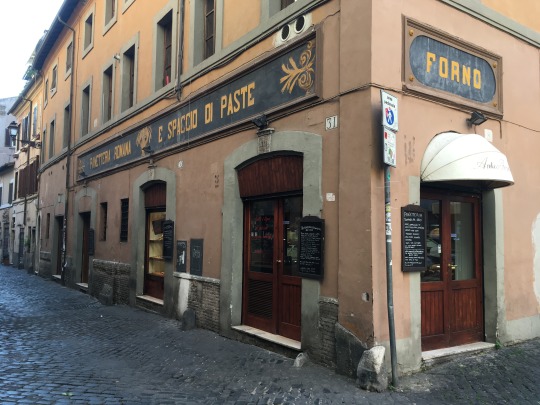
The walk to the Coliseum was about a mile and a half, across the Tiber and past the Circus Maximus. That’s just how Rome was - everywhere that we went, there was something else historic and/or beautiful on the way. The Circus Maximus is an ancient Roman chariot-racing stadium that held a quarter of a million people; only the Indianapolis Motor Speedway can hold that many people today.
At the Coliseum, we waited in line for about 45 minutes to get our tickets (which included entry to the Roman Forum and Palatine Hill). We did not purchase any tickets ahead of time, thinking that it was the off season, and I think that we made the right choice. Purchasing early also requires a fee, and we did not mind waiting (we were in the Coliseum!!). I even found an Italian 5 cent euro coin, which has the Coliseum on the reverse.
Once we had our tickets, we went inside and up the stairs to the exhibits, which are located where you would imagine the concessions to be located at any stadium. It was so fun to learn more about the building, its history and architecture, while we were actually inside! The exhibits were in Italian and English, making it easy for us to absorb the content.
After getting our fill of Coliseum history, we headed out where the seats once were. The sunshine was warm and welcome, and the view was incredible. The entire time we were there I was impressed by its massive size!
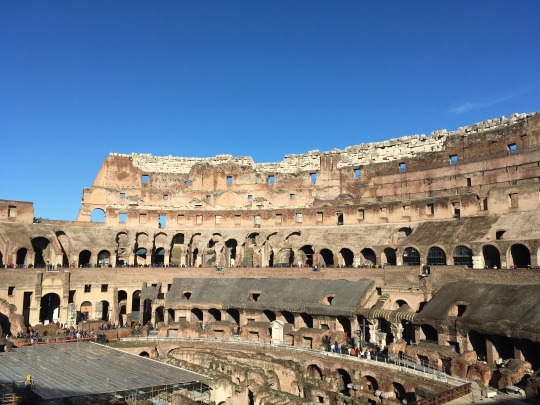
We left the Coliseum hungry, so headed to get an espresso and a quick snack. After talking about our plan for the day, we decided to go to the Historic Center. Our first stop was the charming Torre Argentina Cat Sanctuary located among ancient ruins of four different temples. Torre Argentina also contains part of the famous portico of Pompey, upon whose steps dictator Julius Caesar was betrayed and killed. We watched as a volunteer fed three cats and one of them even hoped into my lap!
Our Historic Center wandering took us along cobblestone streets, through beautiful squares with beautiful fountains (like Bernini’s Four Rivers). I would say that the highlight was stepping inside of the Pantheon, a former Roman temple that is now a Catholic church. The building was built around 110 BCE and, similarly to the Colosseum, is massive! The Pantheon’s dome is considered the Romans’ most important architectural achievement (and it remained the largest dome in the world until the 15th century).

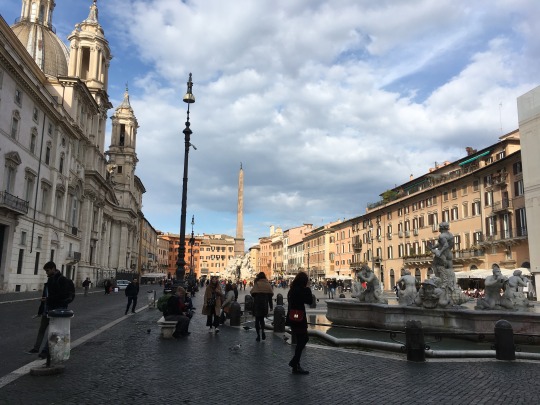
The last stop for us was for a late lunch at Cantina e Cucina. Their lasagna, which Kenny enjoyed, was rated as some of the best in Rome. I had a simple and delicious vegetarian pasta.
Everyday on our trip, we headed back to the airbnb around 3 or 4PM for some rest before heading out for dinner in Trastevere. Given that we walked over 9 miles each day, I think that we earned our sietas!
For dinner, we had pizza and craft beer at Bir e Fud. Israel does not have much of a craft beer scene, so it was fun to get to have an interesting brew; the options at this modern, industrial pub were vast. I had a delicious apricot sour and a pizza with smoked mozzarella cheese. I knew it was going to be amazing the moment the waitress placed it on the table and the smokey aroma arrived inside of my nose! We walked home and were asleep quickly.
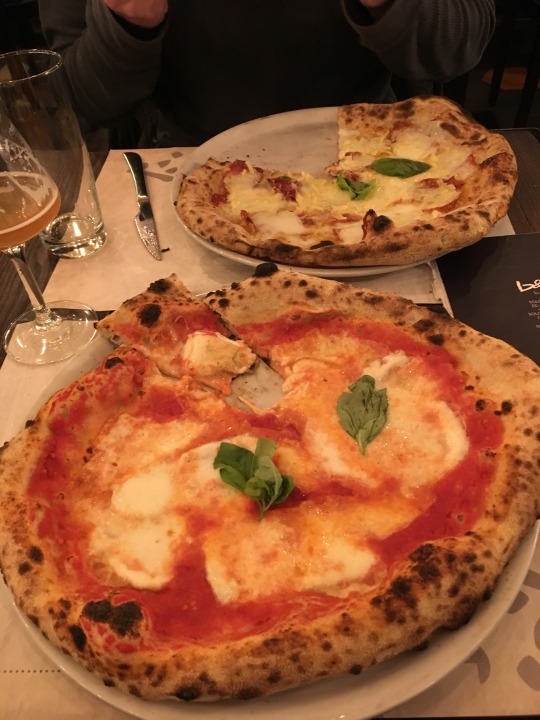
Day 2
The next morning (after a quick breakfast at our favorite, Panetteria Romano) we headed to Palatine Hill. Sandwiched between the Roman Forum and Circus Maximus, Palatine Hill is an atmospheric area of towering pine trees, majestic ruins, and memorable views. Rome’s emperors and other affluent Romans of the Republican period resided on the hill, and excavations show that people have lived in the area since the 10th century BCE.
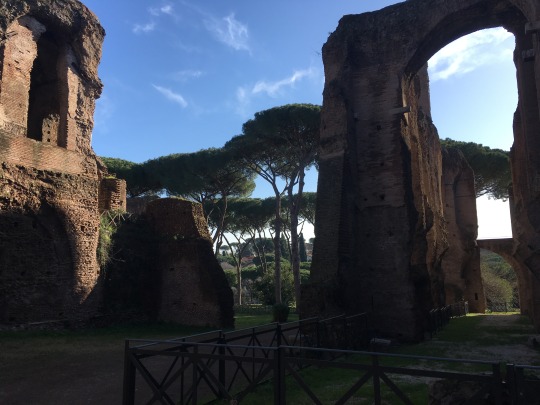
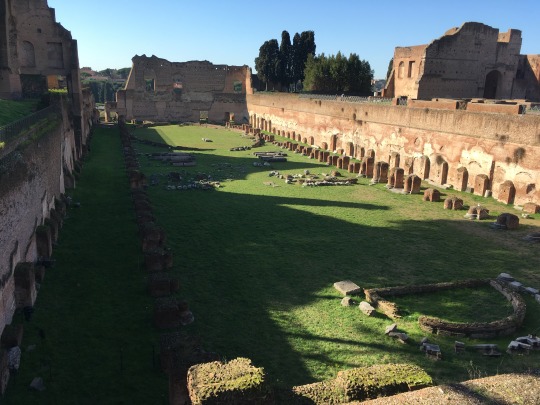

After walking through a millennium of archaeological ruins, the timeline jumped forward another thousand years and we found ourselves in the Orti Farnesiani, one of Europe’s earliest botanical gardens (laid out in the mid-16th century). My brain was overwhelmed by the span of time we were wandering through!
The rush of history continued as we entered the Roman Forum, ancient Rome’s “showpiece center,” a district of temples, basilicas, and public spaces. Currently a collection of impressive ruins. We enjoyed the arches, the Curia (the seat of the Roman Senate - mostly a reconstruction) and the house of the vestal virgins.

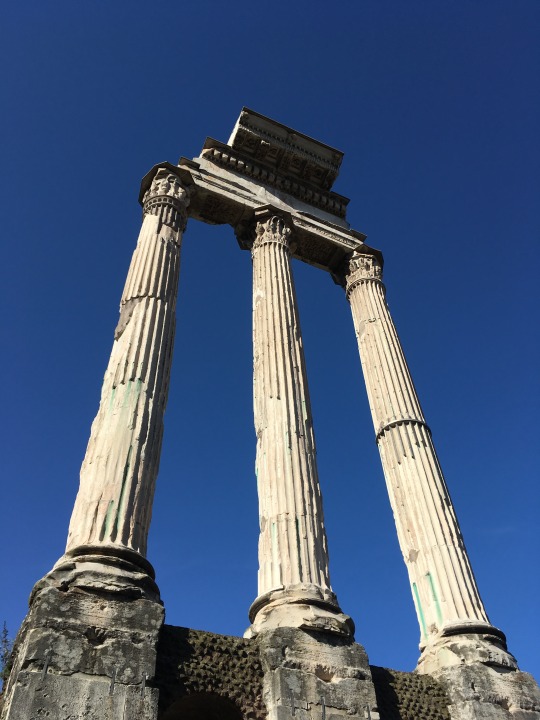
I think if I were to visit Rome again, I would spend more time at Palatine Hill, splurging for the behind the scenes tour. There were several sites that the general public does not get to see that I would have enjoyed.
We headed into the neighborhood of Monti for lunch and randomly popped into Pasta Chef, a simple and unpretentious restaurant on a quiet street. I had the ravioli special: asparagus cream ravioli with a red wine reduction sauce. I’m drooling just thinking about it! Kenny had the lasagna. We were both satisfied with our quick and delicious meal.
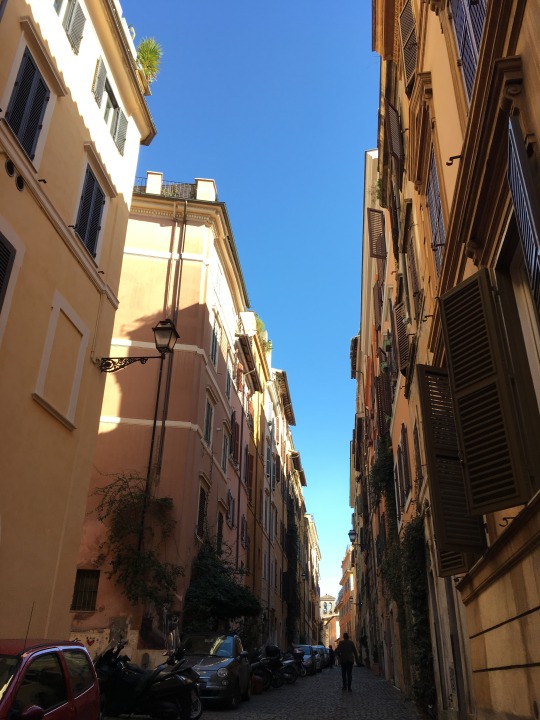
After a long day of walking and a luxurious, if not fast, lunch, we needed a little pick me up. We got espresso at a little coffee shop and then hopped on the Metro to Piazza del Popolo for another afternoon of wandering through Rome’s neighborhoods. Our ambling took us down cobbled car-free streets, up the Spanish steps, and to the impressive Trevi Fountain, where we enjoyed some tasty gelato and tossed coins over our shoulder (thus ensuring our return to Rome).

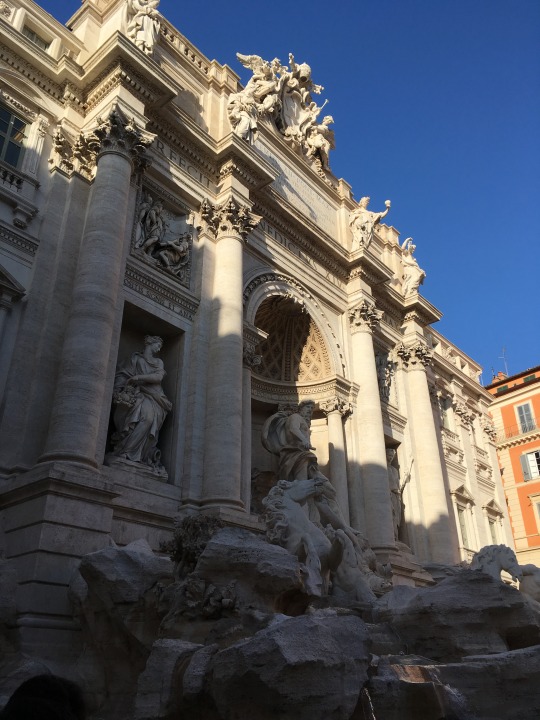
We took the direct route back to the airbnb for another siesta before our evening meal, which we enjoyed at another local trattoria. We got a 50% off discount for booking using a mobile application called The Fork and were able to enjoy a long, romantic meal for half price. It took some of the stress out of ordering multiple courses, knowing that it was going to cost less! We got a bottle of prosecco and bruschetta. I had the traditional pepper and cheese pasta, while Kenny enjoyed lasagna and a nice cut of beef.

Day 3
We spent our last full day in Rome exploring Vatican City. Our walk from the airbnb to Vatican City (with a stop for pastries and espresso, of course) took us along the Tiber and it was absolutely beautiful!
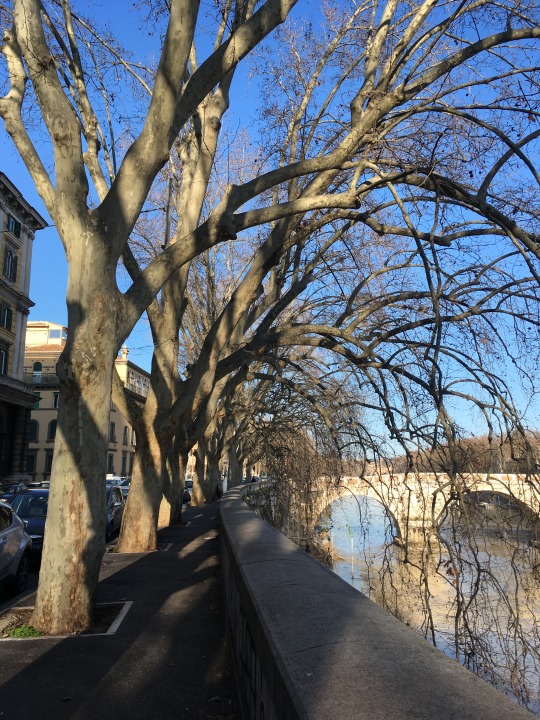
Our first stop was St. Peter’s Square, where there are lovely public restrooms.
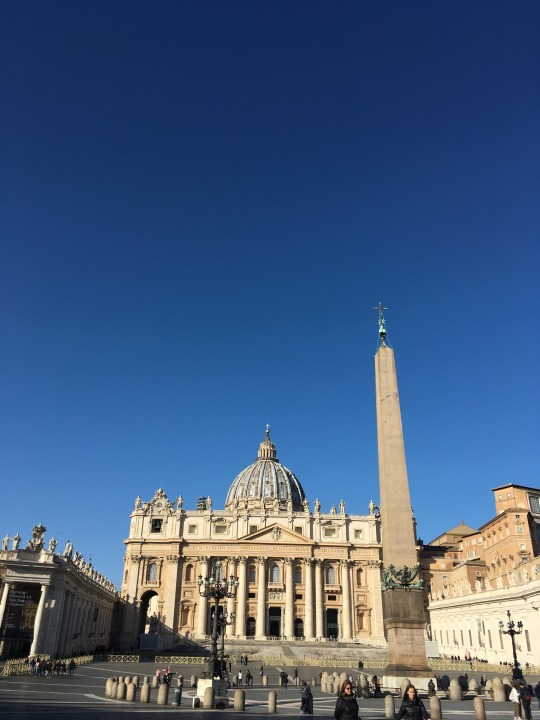
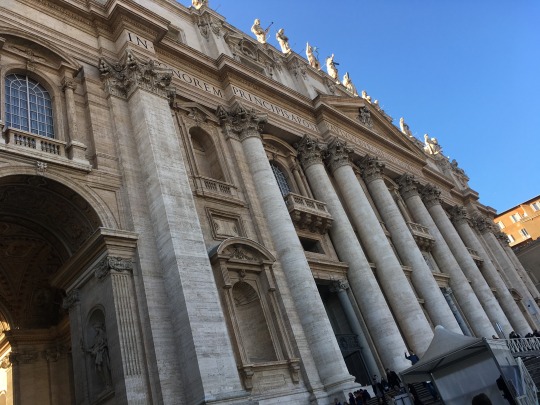
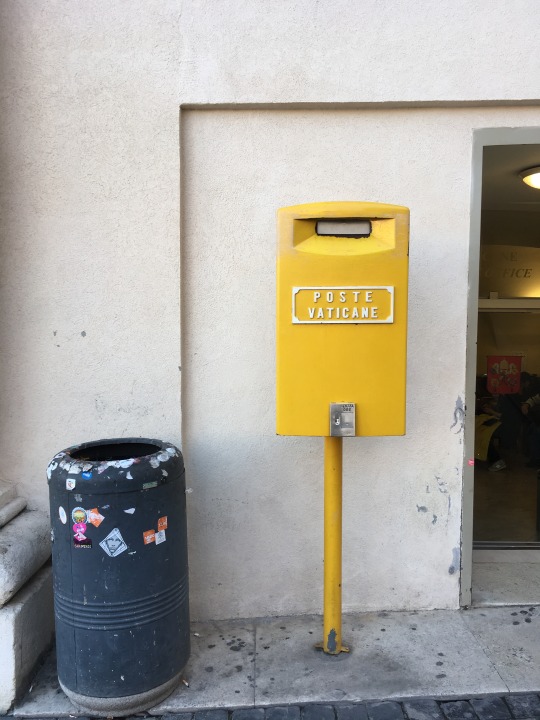
Then, we headed to the Vatican Museums. Based on the guidebook and everything that I had read online, we were expecting a long line (up to 2 hours), but we almost never slowed down and were inside super quickly. Booking tickets online costs twice as much, so I am glad that we decided to wait!
The museums were amazing, exhausting, awesome. They have works from an immense collection amassed by popes throughout the centuries including several of the most renowned Roman sculptures and most important masterpieces of Renaissance art in the world. There are 54 galleries in total and it is one of the largest museums in the world. The Sistine Chapel and Gallery of Maps were our favorite stops.
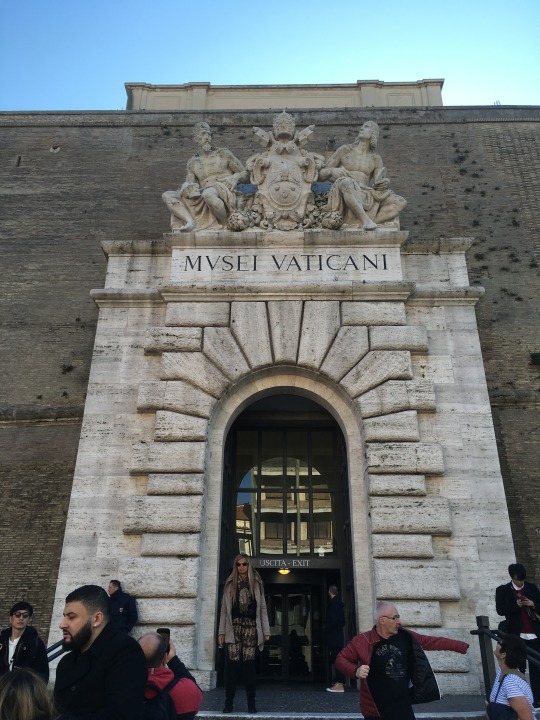
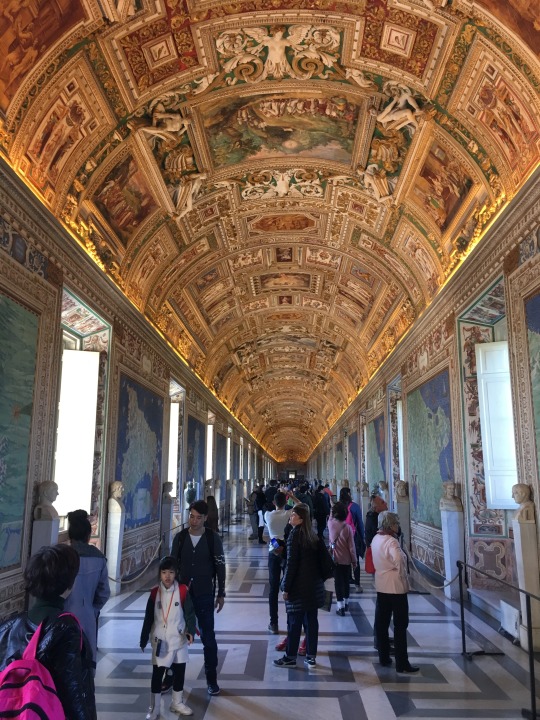

Sunny weather greeted us on our walk to lunch. We stopped at a modest trattoria, where we enjoyed resting our tired legs. Kenny had the lasagna and I enjoyed a fresh salad, and then we shared a delicious four cheese pizza.
We exchanged some shekels for euros in anticipation of our next stop: St. Peter’s Basilica! It is free to get into the massive church, but we had the added goal of climbing to the top of the cupola. St. Peter’s is the largest church in the world, and when we were inside, it felt huge. The ceiling is so high and the entire interior of St. Peter's is lavishly decorated with marble, reliefs, architectural sculpture and gilding! After doing a slow lap around the behemoth structure, it was time for us to climb to the top.
We opted to climb all the way up, instead of taking the elevator halfway. It was around 500 steps to the top and our tired legs met the challenge. Halfway up, the path takes visitors along the inside of the rotunda where you get to see Michelangelo's mosaic masterpieces up close.
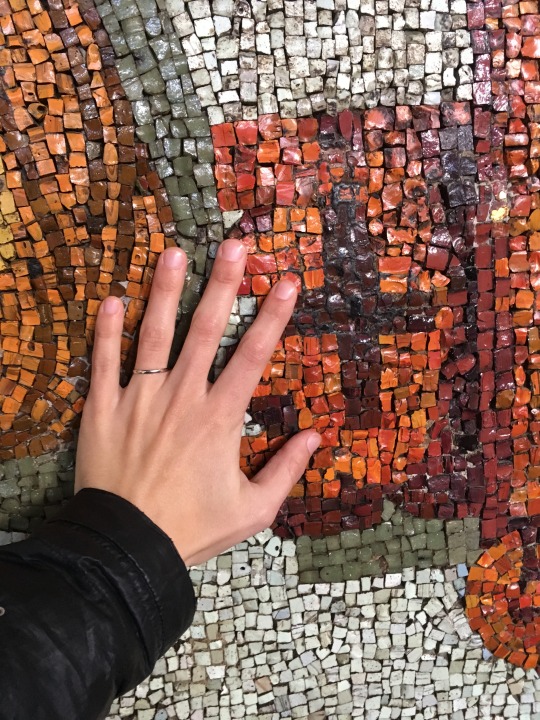

The last bit of the climb is between two layers of the dome. It gets very tight. I had to move my backpack onto my front! The final few flights are up a spiral staircase that it so tight that all there is to hold onto is a rope!
But the view at the top was more than worth the ascent. We got to see the mountains in the distance and all of the neighborhoods and buildings that we had explored the past few days.

At this point, we were tired and ready for another afternoon rest. We headed back, with the intention of stopping at Gianicolo Park for another beautiful view. Unfortunately, there was an ancient wall around the park, so instead of a beautiful view, we went up a steep incline and had a much longer trip back. Gelato made it all better once we made it back to Trastevere!
For dinner, we decided to book another reservation using The Fork. Once again, we had a meal at a 50% off discount. However, this time, the restaurant was not as good. I enjoyed my mushroom risotto, but Kenny’s lasagna and carbonara were not that good. We even got a dessert, cream caramel, and the caramel was burnt! But the liter of house red wine and the company were what made the evening lovely.
Homeward Bound
The next morning, we were up early for our flight back to Tel Aviv. Our shuttle arrived 20 minutes late, but we made it through security in about 10 minutes, and had plenty of time to enjoy our last breakfast of pastries and espresso! Since our flight was over the lunch hour, we also grabbed some takeaway sandwiches.
We had a lovely, charming trip. I am so happy that we chose Rome as our late-honeymoon destination!
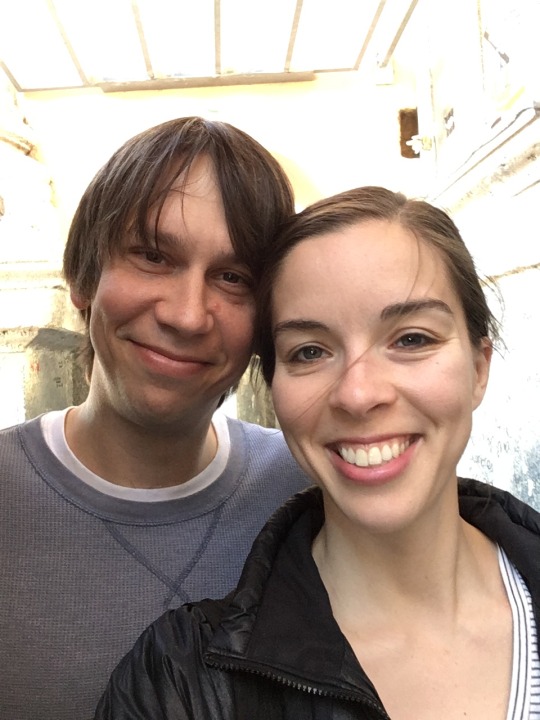
0 notes
Text
Little Switzerland
On Saturday, Kenny and I joined a friend and his children on a lovely hike in Little Switzerland, which is in the Carmel Mountain National Park.

The area was named Little Switzerland by European immigrants for whom the greenery reminded of their former home. While it is beautiful and green, I’m not sure how close it comes to representing the beauty of the Swiss countryside. I guess in comparison to the flatness of the coastal plain and the barrenness of the southern deserts, the association makes sense.

We took a short hike (featuring much singing of “Country Roads” by the youngest, which I found thoroughly amusing) and ended with this beautiful overlook. You can see the sea in the background, and the cliffs across the likely-empty wadi.

And, in traditional Haifa fashion, we saw lots of beautiful flowers blooming, despite the winter chill.
0 notes
Photo

Luna likes to drink beer and play honeymoon bridge about as much as Kenny and I do!
0 notes
Text
What’s in My Carry On
I had a wonderful trip to Georgia for the Christmas holiday, and got the chance to experience much of what I have missed about the US: family, forests, good pizza, and thrift store shopping.
All of my recent and previous travels I always missed something in my carry on, but I think this time I got it right. Here are the things that I hope to never leave behind again!

Buff // This little headband is perfect for messy or dirty travel hair, and doubles as an eye mask. Pull it down when you’re getting sleepy or push it up when it’s meal time!
Thermarest Compressible Pillow // There are so many travel pillows on the market! I love this one because it feels like a normal pillow, yet scrunches down to a small size. I attach mine to my bag with a carabiner, so it doesn’t take up any extra space.
Headphones (phone, charger) // The headphones they’ll give you on the airplane will inevitably hurt your ears - why not bring the ones you’re used to?! Make sure to download some movies and podcasts ahead of time and bring along your charger.
Kindle (charger) // I am a serious reader. Before I moved to Israel, I was a regular at the university and public libraries. I knew that I wanted to way to be able to read books (באנגלית בבקשה) while abroad, so I asked my parents for a Kindle for my birthday. It is amazing and has radically changed the weight (and size) of my carry on! I love the fact that I can have a stack of books in my bag without the burden falling on my shoulders.
Notebook and Pens // It is probably the lack of anything else to do, but my creative juices always start flowing at 10,000 feet! I love having a little notebook on hand so that I can scribble ideas or sketch future art projects down on paper.
Layers // The weather inside an airplane can shift by up to 15 degrees from when you’re taxiing to when you’re up in the air. Even in the summer, I try to always bring along a sweater, scarf, and socks (I am not afraid to rock the sockos). Big scarfs are perfect - they’re basically fashionable blankets!
Water Bottle // Hydration is a big key to conquering jet lag and to staying healthy. Don’t be afraid to hand the flight attendant your giant, empty water bottle; they’ll fill it up to the top!
Cosmetics // I usually bring along a toothbrush, toothpaste, chapstick, and wipes - all essentials for me to not feel gross after a long flight in a dry airplane.
Snacks // Airport food is expensive, so bring along some snacks. I like to take things that take awhile to eat and aren’t too full of calories - that way the snacks keep me busy and don’t weigh too heavily on my stomach on a relatively inactive day. Popcorn, baby carrots, clementines, and cheerios are all great options.
0 notes
Text
Haifa City Museum Exhibit Opening, “1948″
I had the pleasure of being invited to attend the opening of the Haifa City Museum’s groundbreaking exhibition, “1948.” The Haifa City Museum is located in the Haifa’s German Colony, at the foot of the famous Baha’i Gardens. The event was in the evening and it was a pleasure to see the gardens lit up from below for the first time while I walked to the museum with a friend.
As the name suggestions, the exhibition is about the 1948 Battle of Haifa. In an attempt to avoid making this post political, I am going to avoid explaining the topic, and instead, I invite those who are interested to do a little research of their own.
I was told that this was the first attempt at an interpretation of the topic for the public in Haifa. Here is a photograph of the introductory panel (which was also printed in Hebrew and in Arabic):

The exhibition was in two large rooms in a separate building behind the main museum. The two rooms were on two separate floors. To get between the two, you had to go outside and climb an exterior staircase.
As the Haifa City Museum’s curator mentions in the opening panel, the exhibition avoids “imposing one single narrative,” and instead creates “a human mosaic that presents the many facets of one decisive moment.”
Even though I had been given a crash course on the event by my friend on the ride over, I was still confused. The exhibit consisted almost entirely of artworks suggesting a few major themes: war, death, suffering, multiculturalism, and the city of Haifa. Was this an art exhibition? Where was the history, the narrative, the content?

I sort of found what I was looking for in a three-drawer filing cabinet in the room on the first floor. The drawers were full of primary sources, from photographs to copies of orders and reports. There were a few tables in the middle of the room, I am assuming designed as spaces for people to look through the folders, and that is exactly what people were doing.
Groups were gathered both around the table and around the filing cabinet, engaging with primary sources and oftentimes with each other.

Some of the contents can be seen below:


While the primary sources material was interesting, my curiosity to learn more about the event and its impact was not satisfied. I was surprised at the lack of historical interpretation; it seems as though the decision was instead to try to evoke the feelings of the time through art, rather than to interpret the historical events.
While my friend was chatting with someone that she knew, I found myself doing a little internet research of my own on my cell phone (something that I do not think that I have done at museums very often). I think that the content was very much designed with a local, educated audience in mind; I felt very much like an outsider looking in.
In all, it was interesting to attend a museum opening in Israel and to imagine the decisions made by the curatorial team. A night well spent, I would say!
1 note
·
View note
Text
Akko
We spent last Sunday exploring the ancient city of Acre, which is known to locals as Akko (and since we’re local, I’ll call it that). Akko is located to the north of Haifa, on the other side of Haifa Bay, and is one of the oldest continually inhabited cities on Earth. It’s so old that it’s mentioned in Egyptian hieroglyphics. The Phoenicians sailed from Akko to adventure, on long voyages with vessels full of the wares of Assyria. A timeline later, Marco Polo arrived on a boat from Venice.

Akko’s history is long and complex: it’s passed through so many hands, eras, religious, and cultures. It was a major harbor during the crusades and is currently the most holy city of the Bahá'í Faith. The walls of the city, its castles, fortifications, churches, mosques, and temples recite the story of its many rulers, defenders, and builders.

We arrived by bus and immediately found an English map, available in the Enchanted Garden for 3NIS (the same price as the bathroom). We wandered around the city, enjoying getting lost (and found again, thanks to the map) in the narrow alleyways. It felt like we were exploring the narrow clefts of a canyon, except with falafel, shawarma, and arabic coffee.

I am glad that we visited in late November. It was a warm day; I cannot imagine how hot it would be in the high summer! Many of the market stands and shops were not open, but enough were open to get the experience (and taste) of the old city.

One of my favorite things about the old city was the moat, which featured some soccer fields. Kenny and I made a few fantastic moat puns, and I marveled at the practical adaptive reuse of the space.

I figure we will be back with guests, because I think that it is an adventure that cannot be missed!
0 notes
Text
Thanksgiving
This Thanksgiving might be the first Thanksgiving that I went to work: I headed to Herzliya on raining morning, catching two buses and taking a long walk to the office, since I was there early again. I had a lovely lunch with my coworkers and gave a short presentation on the outreach work that I have done so far. A job in Israel is something that I really did not think that I would have, so going in on Thanksgiving was completely okay with me.
I left Herzliya and headed south to Tel Aviv. Kenny and I were planning on meeting up in Jaffa before a Fulbright dinner. I was going to get there about an hour before him, so instead of taking a bus all the way to Jaffa, I got off several stops early, and walked from the market in Tel Aviv to the beach.
I ended up accidentally walking through Neve Tzedek, the first Jewish neighborhood to be built outside the old city of Jaffa. It was established in 1887, 22 years before the 1909 founding of Tel Aviv, by a group Jewish families seeking to move outside of over-crowded Jaffa. It has a village-like atmosphere, with narrow streets, and is filled with boutiques, museums, and cafes.

I found my way to the beach and enjoyed watching the sun set over Jaffa while reading a book on my kindle. After the show had finished, I headed to the Clock Tower, our agreed on meeting spot.
The Jaffa Clock Tower is one of seven clock towers built in Palestine during Ottoman rule. It stands in the middle of Yefet street at the northern entrance of Jaffa. I sat on a bench at the foot of the clock tower soaking in the bustling ancient city. Once Kenny made it, we settled into a little bar and had a drink before heading to dinner.

It makes sense for Fulbright to host a Thanksgiving celebration, and I was very happy to get to celebrate my favorite American holiday with one of my many newfound families. The meal was delicious (will I ever have a better piece of chocolate cake?), but I enjoyed the company even more.

Just a few words on gratitude: Everyday I write down five things that I am grateful for in my planner. I write them in the morning, while reflecting on the previous day. I prioritize this practice because it helps me find utmost joy in (and celebrate) the little things.
It makes every day Thanksgiving.
0 notes
Text
On Haifa
Haifa is Israel’s third city and is often not explored by tourists and travelers. I understand: it’s not the Holy City of Jerusalem or the metropolis of Tel Aviv that never sleeps. In travel guides, it’s often in the back pages, the “and also if you have time” bits that most hurried travelers don’t explore. Despite having almost 300,000 people, I’ve heard the city described by Israelis as provincial.

Haifa is a working city with few tourist destinations, and I’m glad that we’re here and not in the bustle of Tel Aviv or the solemn tension of Jerusalem. What it lacks in tour buses and plastic keychains, Haifa makes up for in magnificent views and cultural diversity. In the “San Francisco of the Middle East,” I can see for miles in almost three directions, and there are Jews, Christians, Muslims, and Druze living in (as much relative as you can imagine in Israel) harmony.
0 notes







